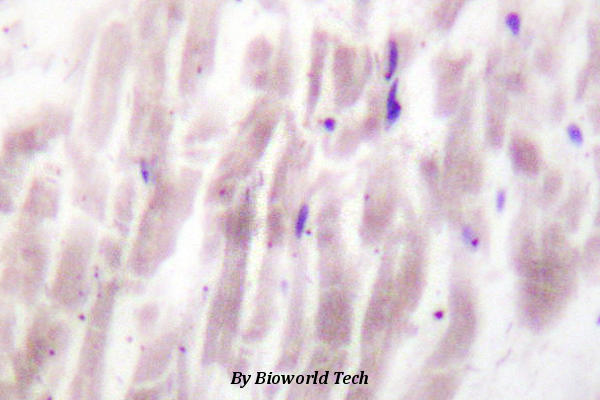Product Name :
PC-PLD1 (K556) polyclonal antibody Background :
Activation of phosphatidylcholine-specific phospholipase D (PC-PLD) catalyzes the hydrolysis of phosphatidylcholine (PC) to generate phosphatidic acid (PA). Insulin activates the PLD-dependent hydrolysis of PC in plasma membranes of adipocytes by a mechanism that may involve wortmannin-sensitive phosphatidylinositol 3-kinase. In addition to the transient activation by growth factors stimulation, PC-PLD is constitutively activated in some of the Src- and Ras-transformed cells. PC-PLD is one of the target enzymes of ischemia; its decrease may cause a perturbation of PC hydrolysis and/or disorders of intracellular signal transduction or choline metabolism for acetylcholine formation in the brain. Product :
Rabbit IgG, 1mg/ml in PBS with 0.02% sodium azide, 50% glycerol, pH7.2 Storage&Stability :
Store at 4°C short term. Aliquot and store at -20°C long term. Avoid freeze-thaw cycles. Specificity :
PLD1 (K556) polyclonal antibody detects endogenous levels of PLD1 protein. Immunogen :
Synthetic peptide, corresponding to amino acids 524-573 of Human PC-PLD1. Conjugate :
Unconjugated Modification :
Unmodification
PC-PLD1 (K556) polyclonal antibody Background :
Activation of phosphatidylcholine-specific phospholipase D (PC-PLD) catalyzes the hydrolysis of phosphatidylcholine (PC) to generate phosphatidic acid (PA). Insulin activates the PLD-dependent hydrolysis of PC in plasma membranes of adipocytes by a mechanism that may involve wortmannin-sensitive phosphatidylinositol 3-kinase. In addition to the transient activation by growth factors stimulation, PC-PLD is constitutively activated in some of the Src- and Ras-transformed cells. PC-PLD is one of the target enzymes of ischemia; its decrease may cause a perturbation of PC hydrolysis and/or disorders of intracellular signal transduction or choline metabolism for acetylcholine formation in the brain. Product :
Rabbit IgG, 1mg/ml in PBS with 0.02% sodium azide, 50% glycerol, pH7.2 Storage&Stability :
Store at 4°C short term. Aliquot and store at -20°C long term. Avoid freeze-thaw cycles. Specificity :
PLD1 (K556) polyclonal antibody detects endogenous levels of PLD1 protein. Immunogen :
Synthetic peptide, corresponding to amino acids 524-573 of Human PC-PLD1. Conjugate :
Unconjugated Modification :
Unmodification
-

-
 Immunohistochemistry (IHC) analyzes of PLD1 (K556) pAb in paraffin-embedded human heart tissue.
Immunohistochemistry (IHC) analyzes of PLD1 (K556) pAb in paraffin-embedded human heart tissue.
Bioworld Biotech only provide peptides for our antibodies and do not provide additional peptide customization services.
Price/Size :
USD 368/1mg/vial
Tips:
For phospho antibody, we provide phospho peptide(0.5mg) and non-phospho peptide(0.5mg).Describe :
Blocking peptides are peptides that bind specifically to the target antibody and block antibody binding. These peptide usually contains the epitope recognized by the antibody. Antibodies bound to the blocking peptide no longer bind to the epitope on the target protein. This mechanism is useful when non-specific binding is an issue, for example, in Western blotting (WB) and Immunohistochemistry (IHC). By comparing the staining from the blocked antibody versus the antibody alone, one can see which staining is specific; Specific binding will be absent from the western blot or IHC performed with the neutralized antibody.Formula:
Synthetic peptide was lyophilized with 100% acetonitrile and is supplied as a powder. Reconstitute with 0.1 ml DI water for a final concentration of 10 mg/ml.The purity is >90%,tested by HPLC and MS.
Storage:
The freeze-dried powder is more stable. For short time at 2-8°C. For long term storage store at -20°C.
Note :
This product is for research use only (RUO only). Not for use in diagnostic or therapeutic procedures.
 PC-PLD1 (K556) polyclonal antibody
PC-PLD1 (K556) polyclonal antibody  Datasheet
Datasheet COA
COA MSDS
MSDS SHIP
SHIP